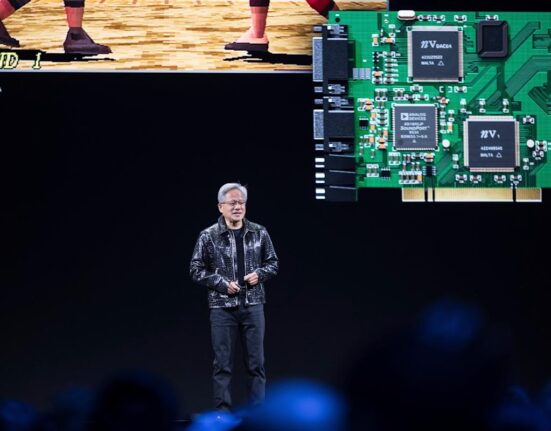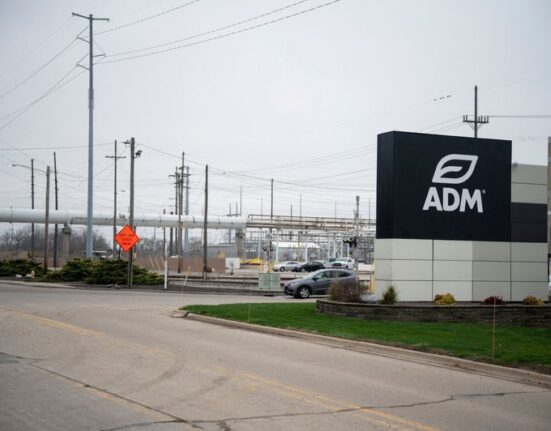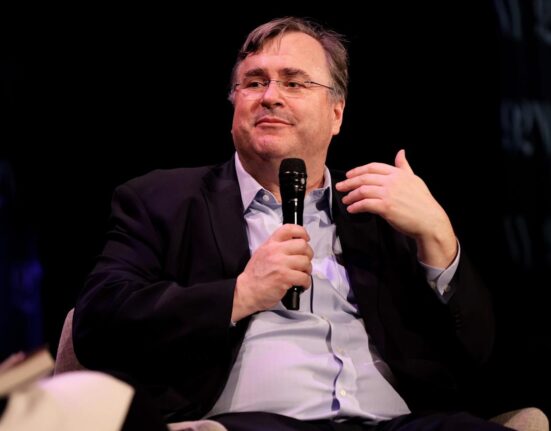The torrent of billion-dollar investment announcements related to artificial intelligence has raised fears that the economy is sitting on a bubble that, if popped, could send it into a tailspin.
Some on Wall Street aren’t buying it.
In a note to clients published Thursday titled “AI Spending Is Not Too Big,” Goldman Sachs economist Joseph Briggs made the case that the billions being spent on building out data centers — known as capital expenditures, or “capex” — remains sustainable.
In short: Briggs believes AI applications are leading to real productivity gains that will help boost companies’ bottom lines. Meanwhile, the cost of the computing processing needed to power those applications justifies the billions in spending, assuming the sophistication of the applications continues to improve.
In total, Briggs expects U.S. companies to generate as much as $8 trillion in new revenue thanks to AI.
“The key takeaway from our analysis is that the enormous economic value promised by generative AI justifies the current investment in AI infrastructure and that overall levels of AI investment appear sustainable as long as companies expect that investment today will generate outsized returns over the long run,” Briggs wrote.
Other key Wall Street players have echoed his assessment. This week, JPMorgan Chase CEO Jamie Dimon compared AI to the internet, which led to its own “dot com” bubble but ultimately created real economic and societal impact.
“You can’t look at AI as a bubble, though some of these things may be in the bubble. In total, it’ll probably pay off,” Dimon said at a conference hosted by Fortune.
Predictions about the economic impact of AI continue to run the gamut, from only a modest bump in productivity to the end of all jobs as we know them. Evidence of current effects so far is mixed, though the roster of companies citing AI or automation as a reason for job cuts — whether they actually intend to meaningfully increase its use — continues to grow.
Amid all those variables, AI’s biggest impact has arguably been on stock returns. Despite some recent drawdowns, major U.S. stock indexes continue to sit near all-time highs, thanks largely to gains from tech companies participating in the AI boom.
On Thursday, tech stocks got another lift when chip manufacturer Taiwan Semiconductor Manufacturing Co. (TSMC) reported record profits and soaring revenues. TSMC is the main supplier of semiconductors for Nvidia — the most valuable publicly traded company in the world — and it also counts Apple, Qualcomm and AMD as clients.
The torrent of billion-dollar investment announcements related to artificial intelligence has raised fears that the economy is sitting on a bubble that, if popped, could send it into a tailspin.
Some on Wall Street aren’t buying it.
In a note to clients published Thursday titled “AI Spending Is Not Too Big,” Goldman Sachs economist Joseph Briggs made the case that the billions being spent on building out data centers — known as capital expenditures, or “capex” — remains sustainable.
In short: Briggs believes AI applications are leading to real productivity gains that will help boost companies’ bottom lines. Meanwhile, the cost of the computing processing needed to power those applications justifies the billions in spending, assuming the sophistication of the applications continues to improve.
In total, Briggs expects U.S. companies to generate as much as $8 trillion in new revenue thanks to AI.
“The key takeaway from our analysis is that the enormous economic value promised by generative AI justifies the current investment in AI infrastructure and that overall levels of AI investment appear sustainable as long as companies expect that investment today will generate outsized returns over the long run,” Briggs wrote.
Other key Wall Street players have echoed his assessment. This week, JPMorgan Chase CEO Jamie Dimon compared AI to the internet, which led to its own “dot com” bubble but ultimately created real economic and societal impact.
“You can’t look at AI as a bubble, though some of these things may be in the bubble. In total, it’ll probably pay off,” Dimon said at a conference hosted by Fortune.
Predictions about the economic impact of AI continue to run the gamut, from only a modest bump in productivity to the end of all jobs as we know them. Evidence of current effects so far is mixed, though the roster of companies citing AI or automation as a reason for job cuts — whether they actually intend to meaningfully increase its use — continues to grow.
Amid all those variables, AI’s biggest impact has arguably been on stock returns. Despite some recent drawdowns, major U.S. stock indexes continue to sit near all-time highs, thanks largely to gains from tech companies participating in the AI boom.
On Thursday, tech stocks got another lift when chip manufacturer Taiwan Semiconductor Manufacturing Co. (TSMC) reported record profits and soaring revenues. TSMC is the main supplier of semiconductors for Nvidia — the most valuable publicly traded company in the world — and it also counts Apple, Qualcomm and AMD as clients.










Leave feedback about this